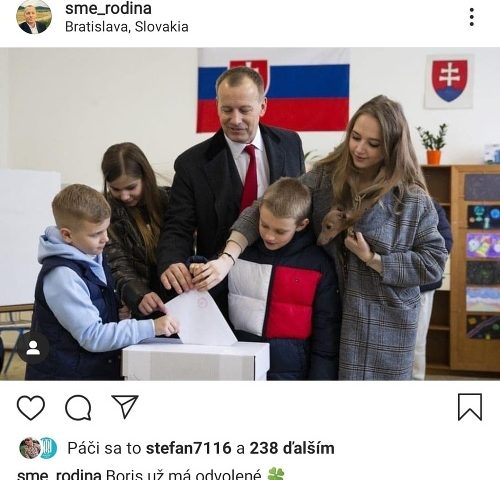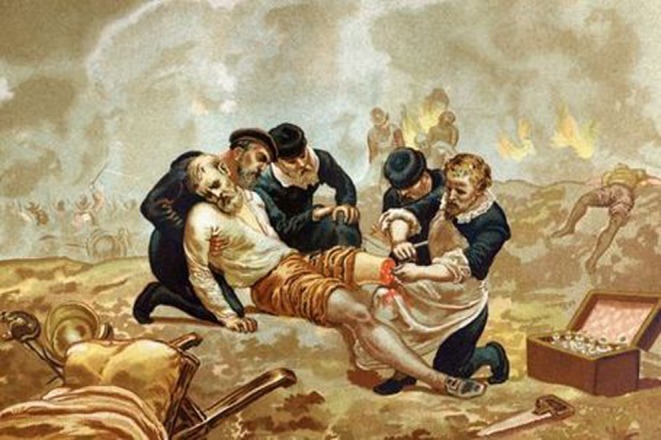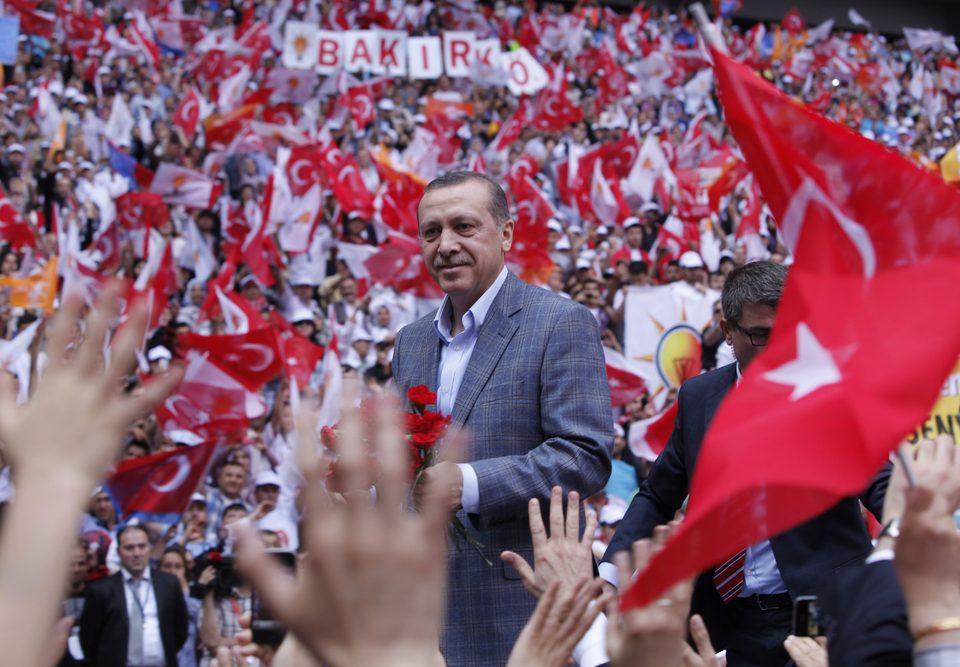By Maxime Forest, OFCE, PRESAGE*

5th Congress of Large Families, Conference of Bishops,© Eliza CC BY-NC-SA 2.0Bartkiewicz
On February 21st, Le Monde published an article titled “Gender wars declared in Eastern Europe”. A few days later, The Guardian reported on the natalist policies undertaken by Eastern European governments in response to falling birthrates(1)Baby machines’: eastern Europe’s answer to depopulation . These policies are touted as a return to a traditional family structure. Major European media outlets quickly caught on to an emerging narrative of two Europes: one that promotes traditional family values and gender roles, and another that enshrines gender equality and opposes discrimination on the basis of sexual orientation and gender identity in their treaties.
The EU faces a political and institutional challenge with certain member states who defy gender equality objectives and are hostile to LGBT+ rights. This opposition is a key part of a larger “illiberal” exercise of democracy that has been heralded by members of the Visegrád Group (Hungary, Poland, Czech Republic, and Slovakia). Praised by Viktor Orban, illiberal democracy is founded on mass referendums and power verticals, the identification of internal and external enemies of the state, and using government resources to rebuild the social order along the lines of traditional values and hierarchies that favor male dominance, heterosexuality, and further marginalize ethnolinguistic minorities (Romani, for example). The concept of illiberal democracy remains a controversial notion within political science(2)Didier Mineur “Qu’est-ce que la démocratie illibérale ? “, Cités, 2019, and its best examples are in states outside the EU.
Between ideology and demographic decline
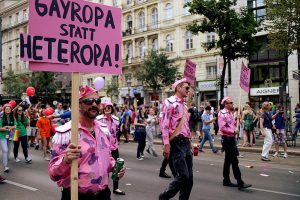
Gayropa (Gay Pride) statt Heteropa, Vienne, 2014. Crédit photo: Christian Kadluba, CC BY-SA 2.0
In Russia, the return to traditional values started in 2017 with the partial decriminalization of domestic violence in the case of so-called “isolated incidents” or if assaults didn’t leave visible lesions or bruises on victims. This continued with draconian legislation targeting sexual minorities and their “propaganda”. These measures, which received strong support from the Russian Orthodox church, were depicted as part of the fight against “Gayropa”(3)Andrew Foxall “From Evropa to Gayropa: A Critical Geopolitics of the European Union as Seen from Russia”, Geopolitics, 2019- the scandalous image of a decadent European Union that is under the thumb of feminist and LGBT+ lobbies and welcomes hords of migrants. This aggressive rhetoric is part of Russia’s challenge to the rule of law and to free, open societies. This rhetoric is a powerful tool whether it is used to establish warm relations with Hungary and Serbia or to justify the conflict in Ukraine.
Russia’s conservative worldview has been welcomed in Central Europe, but it is not the only factor in the rightward pivot of these EU member states. Most of these countries are facing a demographic crisis that often began during the stagnation at the end of the Soviet Union. This was further accentuated by the transition towards market-based capitalism, and continued with mass emigration of educated youth from Bulgaria, Latvia, Lithuania, Poland, and Romania. In smaller countries and/or countries with significant minority populations, in particular Bulgaria and the Baltic states, this demographic decline has reinforced long standing nationalist identity politics.
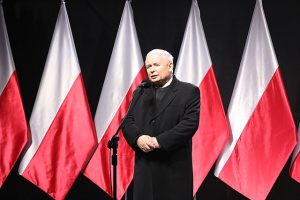
Jarosław Kaczyński, november 2018. © Rafal Zambrzycki. CC-BY -2.0
Reignited during the 2015 refugee crisis, this nationalist discourse galvanized anxiety around the demographic future and placed the fight against gender equality and sexual diversity as a key component in the culture wars. In Hungary, this rallying cry helped Fidesz party securing landslide victories and a political monopoly. In Poland, this discourse was co-opted by different right-wing and far-right religious and political groups, before it eventually fell into the hands of the PiS party of Jarosław Kaczyński. In Croatia, Slovakia, Romania, and even in more secularized countries like Slovenia, this discourse is promoted by political movements linked to the church (Catholic or Orthodox). It is exploited by conservative and populist movements, as seen in the referendums against same sex marriage held in Croatia in 2013 and in Slovenia, Slovakia, and Romania in 2015 (the last two of which failed because they could not meet the legal minimum quorum).
“Gender Theory”: a common enemy

Demonstration against the closure of the University of Central Europe in Budapest, 2017. Photo credit: greensefa – © greensefa – CC BY-SA 2.0
In Hungary, gender theory is a less galvanizing topic compared with xenophobic rhetoric or antisemitic slurs against George Soros, and the cosmopolitan aspirations of the European Project. Nevertheless, it was used to justify the closing of the Central European University in Budapest, on the grounds that the university was a local hotbed for “gender theory”. In Poland, a country far removed from Mediterranean migration routes, and that has also welcomed over a million Ukrainians to prop up its economy, immigration comes second to worries around gender identity. The Polish church is particularly invested in fighting gender theory, even though it is currently facing unprecedented criticism for its inaction on pedophilia scandals and cover-ups. Legislative battles calling for the total criminalization of abortion and exclusion of LGBT+ communities during the last parliamentary and municipal elections speak to the importance of this topic. Even if in Croatia and Slovakia the fight against corruption was a predominant theme in the most recent elections, the demographic crisis and questions around minorities still were featured in party platforms. This was the case for the departing President of Croatia and for the Slovakian Sme Rodina (“We are family”) party, member of a coalition of right wing parties formed following the Slovakian legislative elections. Sme Rodina’s principal goal is to “defend Slovakian families from internal and external threats.”

Boris Kollar, candidate for Sme Rodina (We are a family) during the presidential elections in Croatia, January 2020. Source: Instagram-Sme-rodina
Conservative natalist policies are ineffective
Aside from symbolic victories for the cause, such as enshrining heterosexual marriage in constitutions during the 2010s (in Croatia, Hungary, and Slovakia), this ideology doesn’t translate into significant policy changes(4)Maxime Forest: Europeanizing vs. Nationalizing the Issue of Same-Sex Marriage in Central Europe: A Comparative Analysis of Framing Processes in Croatia, Hungary, Slovakia in Maxime Forest, Réjane Sénac, Bronwyn Winter (coord.) Global perspectives on same-Sex marriage, 2018, Palgrave MacMillan. The social policies undertaken by these governments are part of a larger shift that began in the 1960s to strengthen benefits and parental leave. After the fall of socialism, these policies were maintained and bolstered by tax incentives. At the same time, state-sponsored child care programs that were prevalent under socialism fell victim to privatisation and withdrawal of government support. The scarcity of readily available childcare didn’t negatively affect women, as the old systems did not provide everywhere an alternative to traditional family models. In recent years, birth premiums starting with the first child (Poland) and a system of “baby-expecting” loans (Hungary) have been enacted to up birthrates. With the relative exception of Hungary, the impact of these policies has been limited and most of the countries of the region still register decreasing birth rates.
About gender rights, a Janus-faced heritage
Poster of the Latvian LGBT rights organization for the Baltic Pride 2019. Source: www.lgl.lt website
When looking at the larger questions around gender and the divide on the matter within Europe, it’s important to take into account the socialist heritage and the effects of economic transition and membership with the European Union had on these Eastern and Central European states. These countries, including those with governments who more or less explicitly claim to defend the Christian roots of Europe, have not followed the same path. Many of these countries decriminalized homosexuality as part of de-stalinization reforms in the early 1960s and Poland did this even earlier in 1932 during the nationalist Piłsudski administration. Even if “pride parades” are under attack by ultra conservative movements in Lithuania or Croatia, they have been held without any problems in Hungary and the Czech Republic — two countries who have legalized a form of civil unions– from the 1990s onwards. In Slovenia, the first LGBT organizations emerged in the early 1980s. Within each one of these countries, the illiberal embrace of “traditional” gender roles and family structures has been met with different fates. In Poland, a strong feminist protest movement effectively doomed multiple attempts to ban abortion, and the most recent municipal elections have shown an emerging progressive movement gaining ground in the capital cities of the four Visegrád countries. This movement is vocal on promoting gender equality and sexual diversity.
Weronika Śmigielska, polish feminist ©Tomasz Zawada
None of these countries have followed the same historic path, nor are they uniformly more socially conservative than in the West. Rather, it is the rise of a discourse that is hostile towards gender equality and diversity, that is itself part of a larger iliberal movement that aims to progressively undermine democratic obligations to rule of law and protection of minorities that characterizes this East-West divide in Europe. While the current backlash to a liberal vision of gender roles is not exclusive to Central Europe, there are indeed similar political avatars in Spain and in the Netherlands, these reactionary agendas have the most political clout in Central Europe. Understanding this divide is essential in understanding the (geo)political tensions within the European Union and the obstacles to its policies of expansion and internal relations.
Maxime Forest is an associate researcher at the PRESAGE program, where he handles the evaluation of the “Supporting Equality in Research and Academia” (SUPERA) program, financed by the European Commission, he also teaches at Sciences Po Paris. His work focuses on the comparative analysis of gender equality and anti-discrimination policies in Europe.
- Maxime Forest, Réjane Sénac, Bronwyn Winter (coord.) – Global perspectives on same-Sex marriage, Palgrave MacMillan, 2018
- Maxime Forest, Emanuela Lombardo (coord.) – The Europeanization of gender equality policies, Palgrave MacMillan, 2012
- To be published in 2020 : “Europeanization” in The Routledge Handbook of Europe and Gender, dirigé par Gabriele Abels, Heather MacRae et Andrea Kriszan.
Translation from French by Samantha Fields
Notes
| ↑1 | Baby machines’: eastern Europe’s answer to depopulation |
|---|---|
| ↑2 | Didier Mineur “Qu’est-ce que la démocratie illibérale ? “, Cités, 2019 |
| ↑3 | Andrew Foxall “From Evropa to Gayropa: A Critical Geopolitics of the European Union as Seen from Russia”, Geopolitics, 2019 |
| ↑4 | Maxime Forest: Europeanizing vs. Nationalizing the Issue of Same-Sex Marriage in Central Europe: A Comparative Analysis of Framing Processes in Croatia, Hungary, Slovakia in Maxime Forest, Réjane Sénac, Bronwyn Winter (coord.) Global perspectives on same-Sex marriage, 2018, Palgrave MacMillan |


